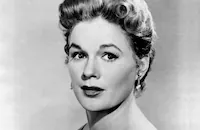Half a Hero

Brief Synopsis
Cast & Crew
Don Weis
Red Skelton
Jean Hagen
Charles Dingle
Willard Waterman
Mary Wickes
Film Details
Technical Specs

Synopsis
At the New York office of Everyone's magazine, freelance writer Ben Dobson reports for a job interview with the editor, Mr. Bascomb. After stressing the importance of old-fashioned virtues such as thrift, Bascomb requests a thorough accounting of Ben's finances, and is pleased to learn that Ben and his wife live modestly in a tenement. Impressed by the younger man's thrift, Bascomb hires him. Ben goes home and breaks the good news to his wife Martha, who replies that this would be the perfect time to start a family. Ben begins his new job, and is disappointed to be assigned the task of rewriting other people's articles. Martha soon becomes pregnant, and gives birth to a boy, Pete. Several years pass, and Ben, who is still stuck on the rewrite desk, invites his boss home to dinner, but Martha's small extravagances on his behalf displease the penny-pinching Bascomb. Martha eventually tires of the inconvenience of trying to bring up a child in a small apartment, and persuades Ben to buy a house in the suburb of Williams Landing. Martha loves their new home, but Ben complains constantly about the expense, and admits he has not yet told Bascomb about the house. One night, Ben announces that their bank account is depleted and proposes they sell the house, but Martha flatly refuses. The following day, Bascomb finally gives Ben his first writing assignment, requesting an article--to be titled "The Slums of Tomorrow"--about post-war housing developments, which he considers traps for "self-indulgent weaklings." Bascomb offers to drive Ben home and, unable to tell the truth about his house, Ben accepts a ride to his former apartment building. To Ben's horror, Bascomb insists on coming in, and Ben tries to pretend that the French-speaking little girl now living in the apartment is his child. On his commute home, Ben thinks about the assignment and sees an opportunity to impress his boss and alienate his neighbors by writing about Williams Landing. Hoping to gather dirt on the other residents, Ben agrees to go door to door collecting for the community chest. Ben discovers that his neighbors also are struggling to keep up with their expenses, and uses their anecdotes as material for his article. Bascomb is delighted with the pages Ben turns in, but when Martha reads a draft of his article, she throws him out. After two days, however, Martha begs Ben to come home and tearfully agrees to his demand that they sell the house. The realtor brings in some prospective buyers, but their critical attitude offends Ben, who begins to see the value of his home and takes it off the market. Ben then submits his article with a new ending praising his neighbors for their pioneer spirit. After telling the surprised Bascomb that he wants a raise and better assignments, Ben meets Martha for lunch, and she tells him she is pregnant. Martha gives birth to twins, and they all live happily in the suburbs.

Director
Don Weis
Cast

Red Skelton

Jean Hagen

Charles Dingle
Willard Waterman

Mary Wickes
Frank Cady
Hugh Corcoran

Dorothy Patrick

King Donovan
Billie Bird
Dabbs Greer

Kathleen Freeman

Polly Bergen
Burt Mustin
Helen Winston
Helen Kleeb
Perry Sheehan
Joann Arnold
William E. Green
Lucille Knoch
Joseph Larson
Catherine Pasquez
Tao Porchon
Hayden Bower
June Whitley
Alexis Davidoff
Dave Willock
Wilson Wood
John Rosser
Jerry Hausner
Charlotte Lawrence
Dick Winslow
Ann Tyrrell
Jessie Arnold
Bobby Diamond
Walter Anthony Merrill
Crew
Peter Ballbusch
Walter Donaldson
Grace Dubray
Joel Freeman
Cedric Gibbons
Josh Greenwald
Sydney Guilaroff
Charles Hunt
Newell P. Kimlin
Arthur Krams
Arthur Lonergan
Frank Mackenzie
Ralph Pender
Robert Quirk
Matthew Rapf
Paul Sawtell
Douglas Shearer
Max Shulman
William Tuttle
Paul Vogel
George Whiting
Edwin B. Willis

Film Details
Technical Specs

Articles
Half a Hero
By Frank Miller

Half a Hero
Quotes
Trivia
Notes
The opening credits feature caricatures depicting Red Skelton and Jean Hagen in a variety of domestic situations. In the end credits, Polly Bergen's name is listed in a different order than in the opening credits. The song "My Blue Heaven" was credited onscreen as follows: "Theme Melody: 'My Blue Heaven,' Walter Donaldson and George Whiting." Only the music, by Donaldson, was heard in the film. According to a April 3, 1953 news item in Hollywood Reporter's "Rambling Reporter" column, a part was being written for Dorothy Dandridge, but she was not in the film. The review of Half a Hero in Saturday Review criticized Hollywood for not portraying the middle classes with the same authenticity and insight with which the very rich and very poor were depicted. After praising English and French filmmakers for their convincing portrayals of middle-class characters, the reviewer wondered "if the middle classes in America had been granted some sort of special dispensation by our movie producers-almost as though that large ticket-buying group mustn't be worried or scared."















